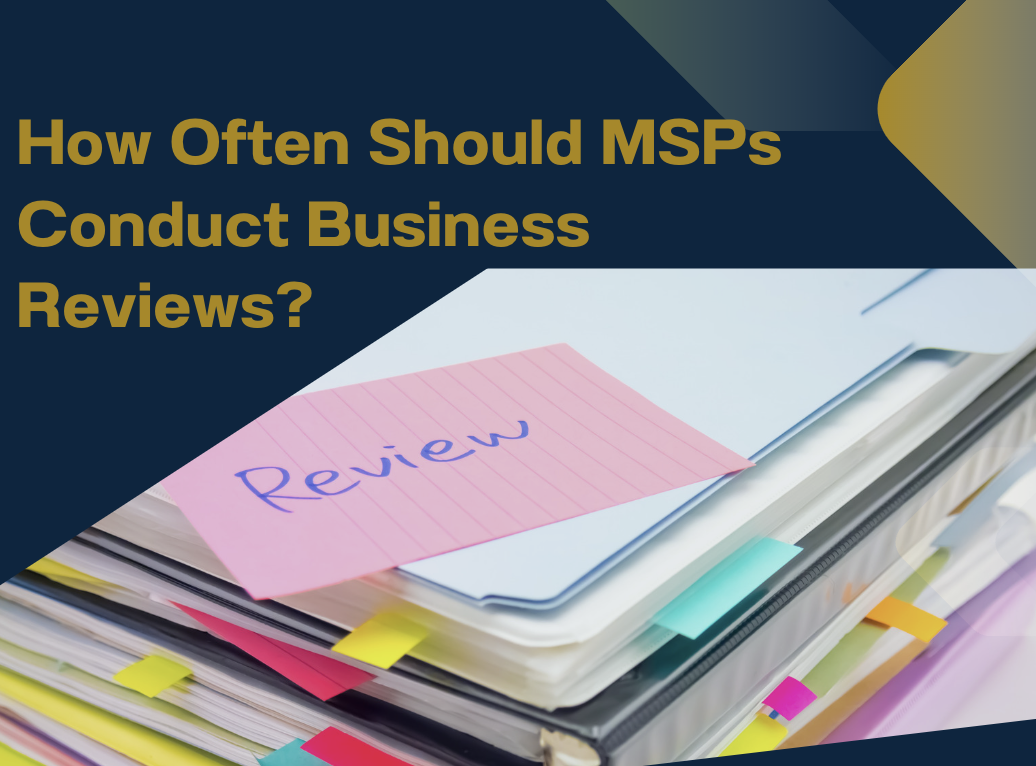As a Managed Service Provider (MSP), conducting regular business reviews is crucial for maintaining strong client relationships, ensuring client satisfaction, and driving long-term success. But how often should these reviews take place? Should you opt for quarterly, biannual, or annual business reviews? In this article, we’ll explore the pros and cons of each option and help you determine the best approach that will help you utilize resources effectively and ensure your clients feel you are bringing valuable insights to the meeting.
The Importance of Regular Business Reviews
Conducting regular reviews allows MSPs to evaluate their performance, identify areas for improvement, and ensure that they are meeting the needs of their clients. Although the primary benefits of regular business reviews are that they help to build trust, strengthen client relationships, and provide valuable recommendations to keep the client running efficiently and securely. By providing clients with regular updates on their performance, MSPs can demonstrate their commitment to delivering high-quality services and meeting the needs of their clients.
By reviewing their own performance regularly, MSPs also benefit from identifying areas where they may need to make changes, improve their processes or procedures, or catch something that may have otherwise been missed. This can prevent issues from arising in the future and ensure that clients are receiving the best possible service.
Another benefit of regular business reviews is that they help MSPs stay competitive in the marketplace. Regularly evaluating your performance also allows you to highlight the successes of your partnership, further solidifying the partnership. How Frequent Business Reviews Should Be?
Quarterly Business Reviews (QBRs)
For larger clients or those with more complex IT needs, quarterly business reviews may be necessary, provided that the meeting agenda is insightful and value-packed. QBRs usually cover a wide range of topics, including service level agreements (SLAs), project updates, and overall satisfaction with the MSP’s services. But it could be more! Your business reviews should be filled with valuable recommendations that can help the client make important business decisions. However, Quarterly Business Reviews (QBRs) may not be the most ideal approach for all clients or MSPs who do not have the resources to handle such a task. Here are some advantages of conducting QBRs:
Advantages of QBRs
1. Proactive identification of issues and opportunities
2. Ability to pivot and adapt to changing client needs
3. Consistent touchpoints to build and maintain strong relationships
4. Educational opportunities to help the client understand industry changes and challenges.
5. Highlighting progress and meeting future goals.
Considerations for QBRs
While QBRs offer numerous benefits, there are some factors to consider:
1. The time and exhaustive resource investment required for quarterly meetings should be considered
2. There’s potential for “meeting fatigue” among clients, so make sure they agree to the quarterly meeting before committing resources.
3. Ensure each QBR provides significant value to the client
Biannual Business Reviews
For smaller clients or those with less complex IT needs, biannual business reviews may be sufficient. These reviews should still cover essential topics such as performance, recommendations, and overall satisfaction but may not need to be as in-depth as quarterly reviews. However, it’s important to tailor the review process to each individual client’s needs.
Most smaller clients may opt for biannual business reviews, conducting meetings every six months and here are some advantages and considerations for this approach:
Advantages of Biannual Reviews
1. Allows more time for implementing changes and measuring results
2. Reduces the time and resource investment compared to QBRs
3. Provides a balance between regular check-ins and allowing time for progress
Considerations for Biannual Reviews
1. Potential for issues to go unnoticed for a longer period
2. Fewer opportunities to build and maintain client relationships
3. Reduced ability to quickly adapt to changing client needs
Annual Business Reviews
For clients with very simple IT needs, annual business reviews may be sufficient. These reviews should still cover important topics relating to the services delivered and overall satisfaction but may need to be more detailed than other frequent reviews since they are done once a year. It’s important to communicate clearly with clients about the review process and to ensure that they understand the value it would bring to their business.
While this approach may only be suitable for some MSPs, it can be advantageous in certain situations.
Advantages of Annual Reviews
1. Allows for a more comprehensive review of the year’s performance
2. Requires the least time and resource investment, and clients are less likely to decline meetings.
3. Suitable for clients with stable and long-term businesses requiring fewer changes.
Considerations for Annual Reviews
1. Lack of regular touchpoints can weaken client relationships
2. Issues may go unnoticed for an extended period
3. Limited ability to adapt quickly to changing client needs
Determining the Right Frequency for Each MSP Client
As an MSP, determining the right frequency for conducting business reviews with clients is critical to maintaining a healthy relationship. The frequency of these reviews should be based on the specific needs of each client and the services provided.
For clients with dynamic environments or specific needs such as compliance requirements, quarterly business reviews may be necessary to ensure that your services are continually aligning with their changing business needs. On the other hand, clients who have smaller, less dynamic businesses may only require an annual review to assess their needs and make any necessary adjustments.
Furthermore, it’s important to consider the client’s budget and resources when determining the frequency of business reviews. Biannual reviews may be a good compromise for clients who require more attention than an annual review can provide but do not need the intense resources that quarterly reviews demand.
Another factor to consider is the level of service provided. Clients who have gaps in services, such as cyber security solutions, may require more frequent reviews to ensure that their needs are being met and to identify any areas for improvement.
Best Practices for Effective Business Reviews
In some cases, a hybrid approach may be the best solution for choosing the right cadence of review meetings. This approach could involve Quarterly review check-ins with key stakeholders on predefined areas of interest. Biannual or annual in-depth business reviews could also come into play when needed, provided the frequency of the review is tailored based on individual client needs.
Regardless of the frequency you choose, here are these best practices that will help you ensure your business reviews are effective and valuable:
1. Prepare thoroughly and involve key stakeholders from the onset
2. Set clear objectives and agendas
3. Use data-driven insights and performance metrics
4. Provide actionable recommendations, share next steps, and avoid trying to sell
5. Follow up on action items and maintain open communication
6. Continuously evaluate and improve your review process
Conclusion
Determining the optimal frequency for your MSP’s business reviews requires careful consideration of your unique resource capabilities and clients’ needs. While quarterly business reviews are the most common approach, biannual or annual reviews may be more suitable in certain situations. Follow review best practices and continuously improve your review process in order to strengthen client relationships, drive long-term success, and set your MSP apart from the competition.
If you need help actualizing your quarterly growth plans and improving managed service client relationships, my customized MSP advisory services can be tailored to your needs. Having worked in the industry for many years, I have proven strategies that have helped MSPs like yours achieve their growth objectives. Let’s have a chat!



